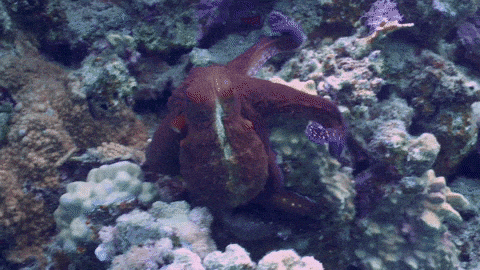|
Getting your Trinity Audio player ready...
|

After an octopus mom lays eggs, she huddles around them, starving herself and protecting them from predators. One octopus off the coast of central California did this for FOUR AND A HALF YEARS.
But this is the momtopus’s last act. When the eggs get close to hatching, female octopuses step away from the eggs and, basically, beat and eat themselves to death. Like, they actually eat themselves.
Why? Their bodies make them.
A 1977 study found that it’s the optic glands near an octopus’s eyes that tell it to destroy itself, but no one knew exactly how this happens. No one until Z. Yan Wang and her colleagues at the University of Washington. They conducted an analysis of California two-spot octopuses’ glands and found that after the octopuses laid eggs, the steroids and related chemicals in the glands went bonkers.
The most notable bonkers reaction was an increase in the levels of a building block of cholesterol called 7-dehydrocholesterol, or 7-DHC. According to LiveScience, “Humans produce 7-DHC in the process of making cholesterol too, but they don’t keep any in their systems for long; the compound is toxic. In fact, infants born with the genetic disorder Smith-Lemli-Opitz syndrome can’t clear 7-DHC. The result is intellectual disability, behavioral problems including self-harm, and physical abnormalities like extra fingers and toes, and cleft palate.”
The results of this study open the door to more findings, which Wang is nerdily and adorably jazzed about. “I’m really, really excited to study the dynamics of the optic gland in that species,” Wang said.





